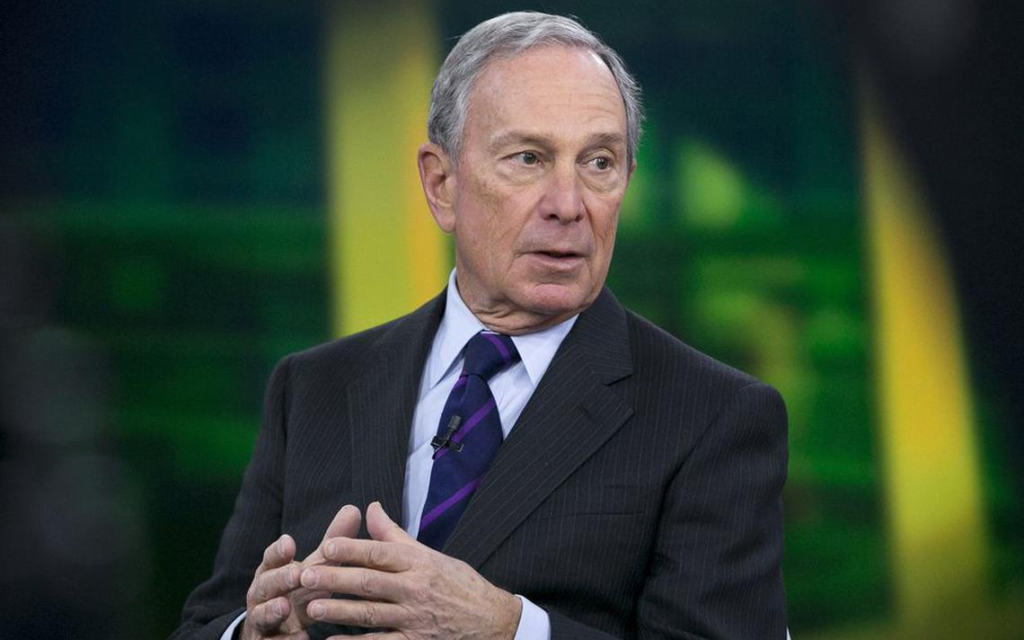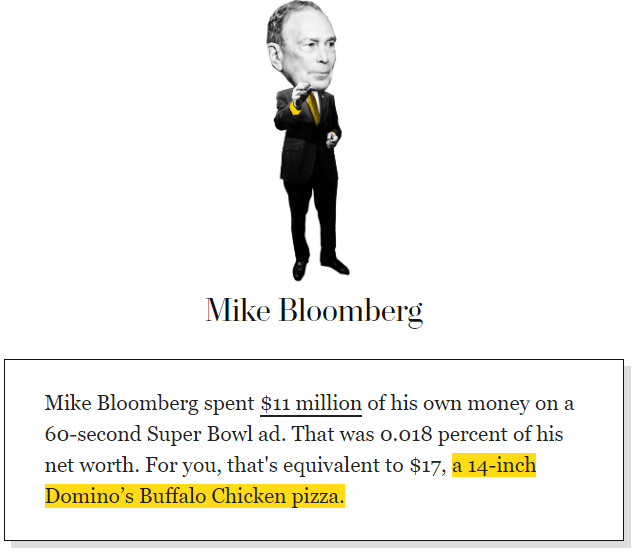Mike Bloomberg’s $11 Million Super Bowl Ad in Perspective
It's literally the equivalent of buying a large pizza for the average American household.

WaPo’s Michelle Ye Hee Lee and Youjin Shin have an interesting interactive feature showing “What Bloomberg’s $11 million Super Bowl ad would cost you on your budget.”
Very few of us can comprehend what it’s like to be uber-wealthy like Mike Bloomberg, one of the richest people in the world and a Democratic presidential candidate.
For example, the former New York mayor spent $11 million of his own money on a 60-second Super Bowl ad. How much money would that mean to you? Let’s put the finances of the ultra-rich into the context of everyday life.
The default setting is $97,300, median net-worth of an American household. Leaving it there gets you this:

The average OTB reader is older and better educated than average, so presumably many of you are wealthier. But I suspect few of you are in a position to buy a Super Bowl ad out of petty cash. And, if you are, please hit up our Patreon.






NDG did something similar with Bill Gates’s wealth back in the day: https://www.youtube.com/watch?v=1lHrYyrFHPs
“It’s literally the equivalent of buying a large pizza for the average American household.”
Which is the argument against Buckley v. Valeo, as Bloomberg deciding to speak has a far greater impact than any of your readers deciding to speak (unless you believe that because Bloomberg is so rich, he is entitled to have his political preferences enacted, in which case we are no longer a country where all persons are treated equally).
@Moosebreath:
But that would be true even if he had the same net worth as me. He owns a major media company, so has a massive platform. And he was a longtime mayor of the biggest city in the country. He’s got enormous access.
Donald Trump is rich. But he didn’t get elected because he was rich but because he was famous and is a world-class self-promoter. He managed to garner hundreds of millions worth of free “earned” media that were unavailable to more qualified but comparatively boring opponents.
Hillary Clinton and George W. Bush were just well-off by comparison. But they had enormous head starts because of their last names.
I’m honestly not sure why money should be the only advantage that we regulate.
Consider two other things:
1) The net worth of even the wealthiest individuals literally pales in comparison to the market value of even the smallest of the big companies (the largest approach $1 trillion or exceed it).
2) These same companies claim they cannot afford to pay a living wage to many of their employees. In fact, they go so far as to hire smaller companies that in turn hire “independent contractors,” because that’s even cheaper.
This is actually a very misleading portrayal, because it relies on the incredibly bogus premise that a fixed proportion of net worth is equally valuable to all. That’s not how utility works.
To a first approximation, to Bloomberg this ad was free. Not having those $11 million does not in any way restrict what he can do in the future, or require him to forego other consumption. It is in the noise of the daily fluctuation in value of his investments. It is, for all intents and purposes, zero.
@James Joyner:
Trump, Hillary Clinton and George W. Bush were running for office (and you are permitted to spend as much of your own money to do so as you want). Buckley v. Valeo is about people who are not running for office spending money to promote someone who is.
@James Joyner:
If he had the same net worth as you, he wouldn’t own a major media company. Unless you are worth far more than I’ve assumed. And that’s sort of the point, isn’t it?
@James Joyner:
Very true.
The same thing will happen on the Sunday pre-Game Show, when he does a fluff interview with, un-official White House Advisor, Sean Hannity.
What strikes me, more than the campaign finance implications is what this says about wealth distribution and how wealthy someone like Bloomberg really is.
@DrDaveT:
Yes, I meant to make that point in the OP but forgot. My net worth is considerably more than average because I’ve been both fortunate and prudent. But most of it is in my house and retirement accounts and therefore not something I can easily dip into.
@Han:
Honestly, most media companies are money-losing sinkholes. That’s true even of top-notch outlets like the NYT and WaPo. So, it would theoretically be possible to own a Bloomberg News and be leveraged to the hilt with debt.
One of the things that gets discussed in data visualization circles (not to mention discussions on innumeracy) is how bad people are at conceptualizing what large numbers really mean.
This approach has often proven to be one of the best ways to bring perspective to these discussions. Does it have flaws? Sure. But it’s still pretty good.
Here’s another good recent example of this:
“Billionaire Jack Ma has donated $14 million to develop a coronavirus vaccine, roughly the equivalent of an average U.S. family donating $33”
https://gizmodo.com/jack-ma-donates-14-million-for-coronavirus-vaccine-li-1841348762?utm_medium=socialflow&utm_source=gizmodo_twitter&utm_campaign=socialflow_gizmodo_twitter
@James Joyner:
In general you’re right about media companies. That said Bloomberg news, and the broader Bloomberg information network operate on a very different model than most other media networks (part of the reason why Bloomberg is as rich as he is).
@Moosebreath: No, the “Buckley” in Buckley v Valeo was U.S. Senator James L. Buckley who was running for office. The principal ruling was about spending on one’s own campaign, although there was an ancillary ruling that independent expenditures were protected. The Court did let stand all manner of other restrictions.
I hope his ad is effective. Remember…Trump has also bought time and is bound to offer up copious amounts of red meat/propaganda. It will be interesting to see how Bloomberg seeks to counter this.
Frankly…I think Bloomberg could make much better use of his money than running for President. Imagine the effectiveness of the GOTV effort he could fund.
Fuq…he should just buy Fox News, and shut it down.
@James Joyner:
You’re right — my objection goes more to Citizens United than Buckley.
@mattbernius: My understanding is that he got rich off on Wall Street and then leveraged that to become mega-rich developing terminals that provided data to other investors. The news business is a spin-off of that but I have no idea whether that side of the business is particularly profitable. It may be, in that news that makes people money (WSJ, e.g.) tends to be more profitable than that which just makes people informed (NYT, etc.).
@mattbernius:
Actually, I think that’s wrong in both directions. On the one hand, Ma will miss those $14M a lot less than an average family would miss that $33. On the other hand, those $14M will do a hell of a lot more toward finding a vaccine than the $33, or even than a stream of half a million $33 donations over the next year.
When you’re wealthy and not a sociopath, the hard part is deciding how much to give to whom. Serious philanthropists employ entire small companies that do nothing else than identify worthy causes and calculate appropriate amounts.
@James Joyner:
Correct. The news arm was developed to help provide content to sell terminal subscriptions. So in that respect it wasn’t as focused on traditional ad-revenue as its funding model. Different sections of Bloomberg are more ad-revenue driven than others.
I guess my (sleep deprived) point is its connection to the terminals makes it a different funding situation (though it also fits into your potential broader point about loss leaders).
@DrDaveT:
Great point and it’s something (working for a non-profit) that I’m deeply familiar with.
And without a doubt, the $14M can do a lot of good. But it would be great to get a broader sense into how much charitable giving Ma or others are actually doing relative to their overall fortunes.
Beyond that, I wasn’t posting the link to throw shade. More to give another example of how this technique helps people gain a different insight into a very large number. We can then have a discussion if it’s a particularly useful insight.
Sausage, green peppers, mushrooms and onions please. On a thin crispy crust.
There used to be a pizza joint in the Sunset on Irving St. near the N Judah Muni streetcar line not far from where my quadriplegic friend Joe lived on 7th Avenue.
He made The City his home for 20 years and was a stoned crazy 49er’s fan. If he had quit smoking those goddamned cigarettes he might still be alive today and we might be at the bar across the street, the one with the porthole window in the door, watching Garoppolo and his crew teach the Chiefs how to play football.
San Francisco 49ers 27-Kansas City Chiefs 21
@DrDaveT:
I’m glad you’re making the point that this is so very relative. A million to a billionaire isn’t much money at all. It won’t change his life by one iota. But for the cost of a busted muffler a working man can lose his job, his health insurance and his home. There is no equivalent for a billionaire.
I’ve long maintained that the core emotion of poverty is not envy but fear. It takes so little to destroy the life of a poor person. The rich don’t have that fear, life is easy, life is safe.
@James Joyner:
This is very true, particularly with print media. Nevertheless, you, with your net worth, I assume could not own a media company. Therefore, if he had your net worth, he would not own a media company. People with your net worth cannot afford to own money-losing sinkholes. This, again, is the point.
…It takes so little to destroy the life of a poor person.
amen
When you haven’t any coal in the stove
And you freeze in the winter
And you curse to the wind at your fate.
When you haven’t any shoes on your feet,
Your coat’s thin as paper,
And you look 30 pounds underweight
When you go to get a word of advice
From the fat little pastor,
He will tell you to love evermore.
But when hunger comes to rap,
Rat-a-tat rat-a-tat at the window
*knock knock* (at the window)
Who’s there? (hunger) oh, hunger!
See how love flies out the door…
@mattbernius:
Sure; I hope I didn’t come across as trying to refute or denigrate your point. There’s a real tension between “wow, he could afford to give so much more” and “thank God he gives anything at all”. As HW Bush reminded us so memorably, private charitable giving drives far more of the necessary maintenance of society than people realize. Wanting to change that, so that having a functioning society doesn’t depend on the whims of the wealthy, gets you labeled a socialist.
Now that we know that it’s in the public interest for a candidate to do whatever it takes to be elected …
I’d rather that Michael Bloomberg spend that ‘pizza money’ by ‘incentivizing’ Russian officials into providing information on Trump’s loans with Russian banks and Russian oligarchs. Also, some information about how Russians laundered money by purchasing properties from Trump would be welcome too, although that might require additional ‘pizza money.’
It’s roughly 0.02% of his net worth, or about $15 to a person earning $75,000 per year.
In terms of impact to his ability to still buy whatever he wants, it’s zero. For him this was a rounding error.
@James Joyner:
The vast bulk of Bloomberg LP’s $10 billion in annual revenue (about 85%) stems from terminal subscriptions, which run around $24,000 per year for one, or $20,000 per year for installations with more than one.
For example purposes, just about every single trading relevant employee at Goldman (traders, managers, analysts, etc.) – and indeed every other market maker in the business – has one at their desk. It’s an enormous revenue generator.
Bloomberg owns 88% of the company.
@DrDaveT:
Mike gave away about $767 million last year, and that figure isn’t an unusual / one time event. I’m not sure that he’s the one who we should be demonizing.
It’s interesting in that I used something like this comparison in quantifying the magnitude of this guy’s wealth to an acquaintance the other day.
I observed that Mike could literally drop $10 million on ads every day – 7 days a week – right on through to Election Day and still not manage to spend 5% of his net worth. It’s a scale of wealth that few can even conceptualize.
@HarvardLaw92:
I’m not sure what I said that you interpreted as demonizing — he’s one of the non-sociopaths, and I noted how difficult it is to give away large sums of money effectively.
So…involving politics, the extent of what most individuals in this country can do is vote, donate a small amount of money, organize voter drives and petitions, and other small sundry activities…meanwhile, a relative handful of people can spend millions of dollars to achieve their political ends…ahh, democracy…
Interesting as well is Bloomberg is polling around around the same percentage. Actually his poll number are better than his spend to net worth, so maybe it’s money well spent…I mean how many times have I heard that Michael Douglas Bloomberg ad on the radio this week….I am still like, what is this guys platform? The money ain’t working
@HarvardLaw92: I didn’t know the numbers but knew the “Bloomberg terminals” were why he went from just rich to mega-rich. My point was that Bloomberg News gave him a big platform. Obviously, being rich makes it a lot easier to buy such a platform. But things like the New Republic or the Atlantic are also big platforms and not money makers.
@HarvardLaw92: Oh, and good to have you back commenting, BTW.
Has anybody heard about Bloomberg’s plans to divest, should he win?
Part of me doesn’t want him to, just so Trumpies can scream and we can all point at Trump and say eff off……
But I also still want the Democratic party to take the high road.
Very conflicted. My desire for revenge is right up there with my desire to maintain the moral high ground. 😉
@Jax:
Divest. We don’t want to set the precedent that the President owning his own news service is at all permissible.
@James Joyner:
The terminals have honestly always been at the base of his wealth. The news division came along mostly as something to add to the terminals to make them more interesting / sell more subscriptions. It does add a little something, but the true value of the terminals has always been (and remains) real-time market data and a deep, deep pool of research & analytical tools. Nobody is spending $20,000 per terminal per year for the news content, trust me 🙂